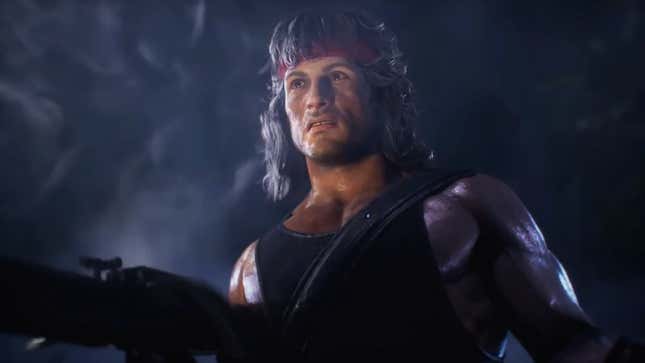
At the end of First Blood, the 1982 movie adaptation of the David Morrell novel of the same name, John Rambo tells his former commanding officer that there’s no turning off the violence he was taught to inflict as a veteran of the Vietnam War. He breaks down. He weeps. It’s a powerful image: the quintessential action hero, broken and defeated, shepherded away in handcuffs from the carnage he spent 93 minutes creating.
And now he’ll be fighting a ninja that can turn into a puddle of water in Mortal Kombat 11.
Thanks to Mortal Kombat developer NetherRealm Studios’ acquisition by the gaming division of Warner Bros. Home Entertainment, it’s been able to acquire iconic guest characters for the series’ most recent installments. 2009’s Mortal Kombat kicked things off with an appearance by A Nightmare on Elm Street slasher Freddy Krueger, and things have only ramped up from there. In just a year’s time, characters like Joker, Spawn, The Terminator, Robocop, and (come next month) Rambo have joined the cast of Mortal Kombat 11, giving the game a mainstream appeal that fighters rarely enjoy.
Since debuting in 1992, the Mortal Kombat series has treated violence with a campiness that’s almost endearing. Back then, watching a fighting game character rip out their opponent’s spine after a match was considered novel and naughty. Where those pixelated graphics make such abject violence nonsensical in hindsight, however, the franchise’s transition to more realistic models has only heightened the discomfort the original game was no doubt meant to elicit. This is all well and good for the longtime Mortal Kombat fighters that were created for such treatment, but it does an injustice to the characters the developers have pulled from other properties.
Sylvester Stallone’s gut-wrenching portrayal of the traumatized Rambo eventually spawned a number of sequels—most recently 2019’s maligned Rambo: Last Blood—none of which carry the same weight or gravitas of the original. First Blood introduced audiences to the walking embodiment of Vietnam War-induced PTSD. It brought the violence that the United States inflicted on the peoples of Southeast Asia home. But the franchise soon became just another hollow symbol of American exceptionalism bearing little resemblance to the source material.
As Rambo’s appearance in Mortal Kombat 11 is explicitly based on First Blood, I’m uneasy about the partnership. It’s important to note that he only kills one person in that initial film, and unintentionally at that. Most of the movie depicts Rambo’s attempts to evade capture, using only nonlethal methods to dispatch his pursuers. Having him behead Sub-Zero or use a bow and arrow to shoot Scorpion’s eyes out the back of his head completely undermines his character in First Blood and the movie’s underlying message. You may be thinking, “well, we don’t know if he’s going to do those things in the game yet.” And you might have a point if Mortal Kombat 11 didn’t already have a history of cheapening the legacies of its guest characters.
1987’s RoboCop is one of my favorite movies of all time. Not only is it a superb action flick, but the way in which director Paul Verhoeven satirizes the entire genre with his depiction of capitalism acting as the impetus for an increasingly militaristic police state still resonates today. And, much like First Blood, it also has a lot to say about violence, particularly its traumatizing effects and the way it’s used by those in power. That said, you completely miss out on these key details if your only knowledge of RoboCop as a character comes from his appearance in Mortal Kombat 11, which almost celebrates the themes that the movie was meant to critique.
While just appearing in a game like Mortal Kombat 11 does the character a disservice, the most egregious example of Mortal Kombat 11’s misunderstanding of RoboCop comes during one of his Brutalities, round-ending finishers during which the game unleashes its most heinous violence. In the movie, RoboCop becomes RoboCop after police officer Alex Murphy is gunned down. It’s a brutal scene. Murphy’s hand is blown off by a shotgun, then his arm. His attackers reduce him to a bloody torso before shooting him in the head. Even as a cyborg, RoboCop is haunted by memories of his death. So, naturally, Mortal Kombat 11 turns this sequence into a Brutality, allowing RoboCop players to inflict the same violence that led to his creation.
Like many Verhoeven projects, RoboCop is a violent movie. RoboCop is a violent character. He’s been programmed to dispatch crime without hesitation, which often leads to extrajudicial moments like shooting a would-be rapist’s dick off. But in turning his violently traumatizing murder into a gameplay mechanic, the Mortal Kombat 11 developers showed a complete misunderstanding for what continues to make the film relevant. It’s possible to enjoy RoboCop as a mindless piece of entertainment—believe me, I love the stupid shit in this movie—but I was blown away by the disregard Mortal Kombat 11 shows for even the most simple story beats.
I adore Mortal Kombat, even as its violence has become more and more realistic. There’s something very satisfying in the crunchiness and squishiness of its combat. The campiness for which it’s become known is a core part of the series’ identity that I don’t want to see go away. But as it stands, the devs have proven they don’t have the finesse to handle the legacies of characters like Rambo and RoboCop. It’s hard to get across the anti-war and anti-corporation themes of the source material in the 99 seconds of a fighting game match, and I’d rather they not try if this is the best they can do.